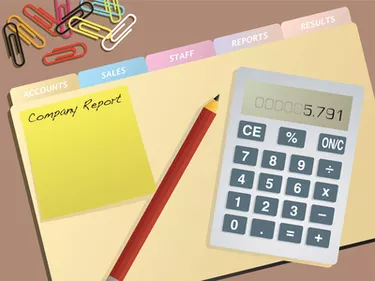
For U.S. federal income tax purposes, a regular or Subchapter C corporation must identify its overall accounting method on Form 1120, Schedule K, Line 1 as either cash, accrual or other. Generally, a corporation may use any method of accounting supported by underlying books and records that clearly reflects taxable income on a consistent basis (Internal Revenue Code Section 446).
Cash Method
Video of the Day
Most small corporate taxpayers use the cash receipts and disbursements method. This method calls for income recognition when corporations receive payment or when funds are set aside for their use. Claims for deductions under the cash method may only occur when corporate taxpayers actually make payment before year-end and only if payment does not create an asset with a useful life lasting longer than 12 months.
Video of the Day
Accrual Method
All corporations with average annual gross receipts exceeding $5 million must use the accrual method. This method broadly requires income recognition upon the completion of earnings activities and allows for expense deduction upon incurring a liability. Note that convoluted provisions in the tax code may apply to situations where corporations receive payments before completing earnings activities or make payments before liabilities actually exist.
Other Methods
The tax code allows corporations to use a combination of cash, accrual or other accounting methods that clearly reflect taxable income on a consistent basis from year to year. The method should also achieve a reasonable matching of related income and expense items. For instance, a corporate taxpayer cannot use the cash method for figuring income and the accrual method for figuring expenses, or vice-versa.
Special Item Methods
No matter which method of accounting a corporation uses, it must also follow complicated accounting rules for special items, such as inventory purchases and sales, long-term contracts, installment sales, fixed asset depreciation and farming business activities. You may want to consult with your tax attorney or certified public accountant regarding specific questions on these and other highly nuanced topics.
Change in Methods
A corporation chooses its accounting methods upon filing an initial federal income tax return. In order to subsequently change methods of accounting for any future year, a corporation must file Form 3115 in order to obtain approval from the Internal Revenue Service. In addition, corporate taxpayers usually need to take into account special timing adjustments under IRC Section 481(a) in order to avoid duplicating or omitting items of income or expense.